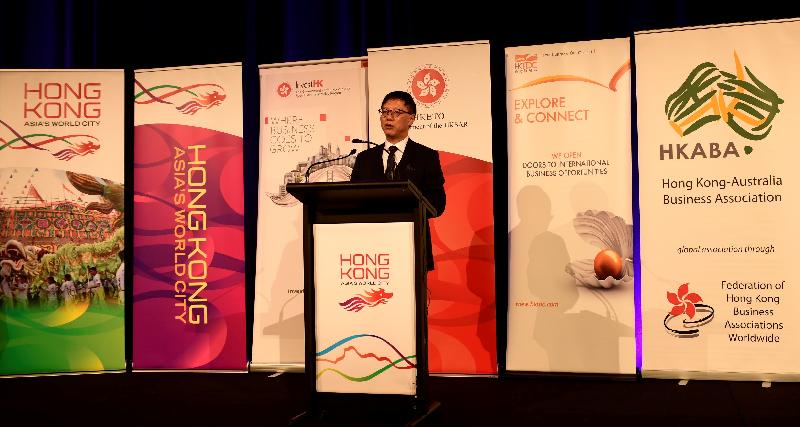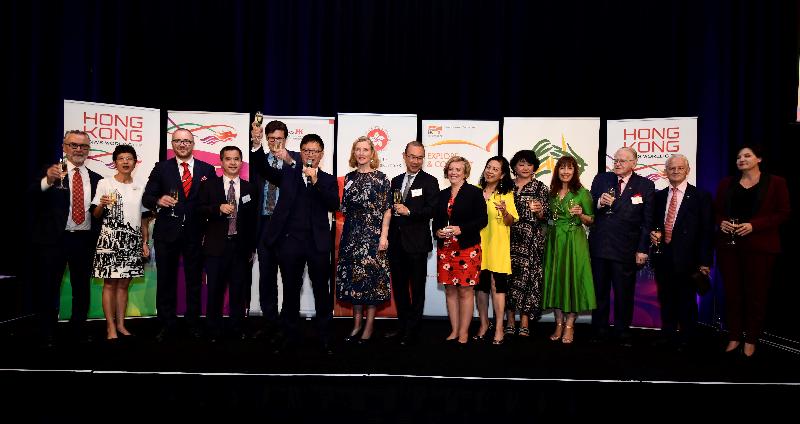LCQ10: Certification systems for Chinese medicines pharmacists and personnel
Following is a question by the Hon Wong Ting-kwong and a written reply by the Secretary for Food and Health, Professor Sophia Chan, in the Legislative Council today (February 20):
Question:
Some members of the Chinese medicines industry have relayed that currently, there is no professional qualification certification system for Chinese medicines pharmacists and personnel in Hong Kong, resulting in a lack of protection for the health of those members of the public who take Chinese medicines. In addition, the Office of The Ombudsman published in December last year a direct investigation report, recommending that the Government consider setting up a certification system for Chinese medicines pharmacists. In this connection, will the Government inform this Council:
(1) of the number of reports, received by the authorities in each of the past five years, about members of the public feeling unwell or being poisoned as a result of taking Chinese medicines wrongly; the measures (including those about proper dispensation and decoction of Chinese medicines) currently put in place to protect the health of members of the public in taking Chinese medicines;
(2) whether it knows the current number of Chinese medicines personnel in Hong Kong and, among them, the respective numbers of those responsible for dispensing Chinese medicines (i.e. Chinese medicines pharmacists) and those holding professional qualifications of Chinese medicines pharmacists certified by authorities outside Hong Kong;
(3) given the establishment of a registration system for Chinese medicines pharmacists on the Mainland, an examination system for Chinese medicines pharmacists in Taiwan, and a certification system for Chinese medicines technicians in Macao, whether the authorities have plans to set up a certification system for Chinese medicines pharmacists; if so, of the details; if not, the reasons for that; and
(4) as members of the Chinese medicines industry generally support the setting up of a professional qualification certification system for Chinese medicines personnel to strengthen the relevant regulatory and training work, whether the authorities have plans to explore this matter with the industry and to provide the needed assistance; if so, of the details; if not, the reasons for that?
Reply:
President,
My reply to the four parts of the question is as follows:
(1) At present, a stringent regime has been set up under the Chinese Medicine Ordinance (Cap. 549) (CMO) in Hong Kong for the regulation of Chinese medicines (including Chinese herbal medicines (Chms) and proprietary Chinese medicines (pCms)) and Chinese medicines traders, including:
(i) Regulation of proprietary Chinese medicines
All pCms falling within the definition specified in the CMO must be registered by the Chinese Medicines Board (CMB) under the Chinese Medicine Council of Hong Kong (CMCHK) before they can be imported, manufactured or sold in Hong Kong. To be registered in Hong Kong, all pCms must meet the registration requirements regarding safety, quality and efficacy prescribed by the CMB.
Noting the progress of pCm registration and that there is room for improvement in the regulation of pCms, the Government has embarked on relevant work. On amending the definition of “pCms” under the CMO, the Department of Health (DH) conducted several rounds of consultation with the industry and various stakeholders on the amendment proposal in 2018. We will brief the Legislative Council about the amendment proposal in due course.
Furthermore, in accordance with the requirements of the Import and Export (General) Regulations (Cap. 60A), importation or exportation of pCms specified in Schedules 1 and 2 must be covered by an import or export licence. The DH has also been working closely with other government departments, such as the Hong Kong Police Force, the Customs and Excise Department, the Government Laboratory and the Consumer Council, for the exchange of intelligence and the conduct of joint operation when necessary.
(ii) Regulation of Chinese herbal medicines
As for Chms, since there are a huge range of varieties of Chms, under the prevailing regulatory mechanism, they are classified into different categories according to their toxicity and degree of popularity in Hong Kong. Having regard to the need of regulatory control, we have included 605 types of Chms in the CMO, of which 31 types are listed in Schedule 1 and 574 types are listed in Schedule 2. Schedules 1 and 2 have clearly stated the origin of each Chm such as the information of the scientific name of plant or animal origin (including the family, genus and species) and the medicinal parts for identification. The Chms specified in Schedules 1 and 2 shall only apply to the dried or processed form of such medicines.
According to the Import and Export (General) Regulations, all Chms in Schedule 1 and five Chms in Schedule 2 (namely Radix Clematidis, Flos Campsis, processed Radix Aconiti, processed Radix Aconiti Kusnezoffii and Radix Gentianae) are subject to import and export control. Importation or exportation of these Chms must be covered by an import or export licence.
(iii) Regulation of Chinese medicines traders
Any person engaging in the business of retail or wholesale of Chms, as well as wholesale or manufacturing of pCms, must apply for and obtain the relevant licence from the CMB before commencing business. Licensed Chinese medicines traders, when carrying on business operations, shall comply with the CMO and its subsidiary legislation, the practising guidelines for Chinese medicines traders and restrictions prescribed in other laws, otherwise the CMB may consider taking disciplinary action against them.
As regards the dispensing of Chms, the CMO stipulates that the Chm retailers concerned shall ensure that each responsible person and his deputy(ies) must comply with the requirements regarding knowledge and experience as set out in Schedule 1 to the Chinese Medicines Regulation (Cap. 549F). In addition, the CMCHK has compiled the Practising Guidelines for Retailers of Chinese Herbal Medicines with an aim to encourage people engaging in the Chinese medicines trade to acquire the relevant knowledge and adhere to professional ethnics, thereby ensuring the quality and safety of Chinese medicines.
(iv) DH’s surveillance mechanism
To ensure the compliance of Chinese medicine products with safety and quality standards, the DH has put in place a market surveillance mechanism under which samples of Chinese medicines are collected from the market for testing on a regular basis. To safeguard public health, the DH has also established a mechanism for reporting adverse incidents related to Chinese medicines. Through this mechanism, the DH works closely with the Hospital Authority to conduct risk assessment, management and reporting on suspected adverse incidents arising from the use of Chinese medicines. If any sub-standard Chinese medicine products are found, the DH may request the Chinese medicines traders concerned to recall the products, prosecute the traders, refer the cases to the CMB for follow-up actions, and issue press statements. The DH also conducts regular inspections in the premises of Chinese medicines traders to ensure their compliance with the requirements of the law and the practising guidelines. To further enhance the capability of Hong Kong in handling problems related to the safety and quality of Chinese medicines, the DH has established a communication mechanism to maintain close liaison with the relevant Mainland regulatory authorities.
(v) Publicity and public education
The DH has made continued publicity and education efforts to promote the safety of Chinese medicines. The message of safe use of Chinese medicines is conveyed to the public, the industry and relevant stakeholders through various channels, e.g. roving exhibitions, talks, promotional leaflets and brochures, and letters to Chinese medicine practitioner (CMP) organisations, Chinese medicine associations and CMPs. Moreover, the DH always reminds the public to seek advice from healthcare professionals before taking any medications. Those who feel unwell after taking medications should seek advice from healthcare professionals, or seek medical consultation immediately in severe cases.
From 2014 to 2018, the Centre for Health Protection of the DH received a total of 125 poisoning cases involving Chinese medicines (detailed in the table below). After investigation, it was found out that these poisoning cases were mainly caused by inappropriate use of medicines (including taking medicines without seeking advice from CMPs, overdose and improper decoction), and mixing up and contamination of Chms, etc.
| Year | Poisoning Cases Involving Chinese Medicines |
| 2014 | 28 |
| 2015 | 23 |
| 2016 | 31 |
| 2017 | 21 |
| 2018 | 22 |
| Total | 125 |
(2) At present, no registration system has been established for Chinese medicines pharmacists in Hong Kong. However, according to the CMO and its subsidiary legislation (i.e. the Chinese Medicines Regulation), a Chm retailer engaging in the dispensing of Chms and a pCm manufacturer shall each nominate a person responsible for the supervision of the dispensing of Chms and the manufacturing of pCms respectively (responsible person), and not more than two deputies, one of whom shall act in the absence of that responsible person. Each of the responsible person and his deputy(ies) shall fulfil the requirements regarding knowledge and experience as specified in Schedule 1 to the Chinese Medicines Regulation (detailed at the Annex).
In addition to the above statutory requirements, the Practising Guidelines for Retailers of Chinese Herbal Medicines compiled by the CMB will also ensure that those engaging in the Chinese medicines trade have the knowledge of Chms and their preparation. The Guidelines set out the criteria for the trade to fulfil with regard to the dispensing of Chms (including verification of prescriptions, preparation, cross-checking, packaging and dispatching medicines).
As at January 31, 2019, there were 274 licensed pCm manufacturers and 4 752 licensed Chm retailers (1 352 of which were allowed to dispense Chms) in Hong Kong, with a total of about 3 600 responsible persons and deputies.
(3) and (4) The Food and Health Bureau and the DH will conduct a study on the proposed accreditation of Chinese medicines pharmacists, which matters such as the qualifications and academic requirements for Chinese medicines pharmacists, their scope of duties and functions, and information on their training needs and employment situation will need to be examined. In addition, we need to thoroughly consult the trade and relevant stakeholders in order to reach a consensus and broad support for setting the direction of relevant policy development.
Moreover, the Government will provide funding support to the Chinese medicine and Chinese medicine drug sectors through the $500 million Chinese Medicine Development Fund in order to further promote the development of Chinese medicine in Hong Kong. The Fund is expected to commence operation in the first half of 2019. We will encourage the industry to utilise the support under to Fund to conduct research and make recommendations on relevant topics. read more



